In this article I would like to mention from practice in Nghe An why the disposal of pesticide waste is still not done thoroughly.
The number of pesticide waste storage tanks is less than 50% of the need
On average, Nghe An grows over 380,000 hectares of crops each year, using around 350-600 tons of pesticides. All the above amount of pesticides will remain on the field at least 35-40 tons after application. Tons of packaging and bottles, labels (collectively referred to as pesticide waste), and a residual amount of medicines in such waste.
Pesticide spraying has caused environmental pollution of water, soil and air… But more dangerous is that after spraying, all kinds of pesticide waste are left on the field, which not only causes greater pollution, but also difficult or impossible is decompose.
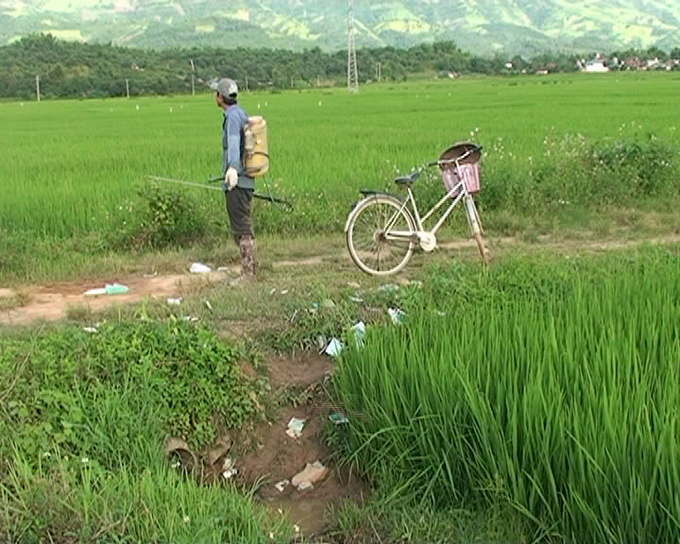
In many places in Do Luong (Nghe An), farmers indiscriminately throw away packaging and bottles of pesticides on the field. Picture: Wisdom.
As we are aware of the dangers of using pesticides and disposing of pesticide waste in the field, we are currently unable to effectively control these for many reasons.
The first: In all previous measures to prevent pests and weeds that damage plants, we attach importance to the use of chemical drugs as a leading measure, an irreplaceable measure that cannot be replaced. Disregard cultivation methods so as not to harm the environment, the survival of other organisms and even human health. These are the measures:
The seeding density is low, which both lowers production costs and reduces or has very little effect on harmful pests such as leafhoppers, leaf rollers, beetles, aphids, powdery mildew, etc.
Apply balanced and sensible fertilizers, especially nitrogen fertilizers, to limit leaf blight, leaf blight and dry rot.
Careful, fine plowing and soaking of the soil before sowing is both a good method of intensively growing crops and basically killing weeds without the need for as many herbicides as are used today.
Applying the cultivation process of IPM, ICM, SRI… both scientifically and rationally while preventing and limiting the occurrence of many types of destructive pests and diseases… greatly reduces the need for the use of pesticides.
If the above measures are implemented well, it will be possible to limit the amount of pesticide waste left indiscriminately on the fields.
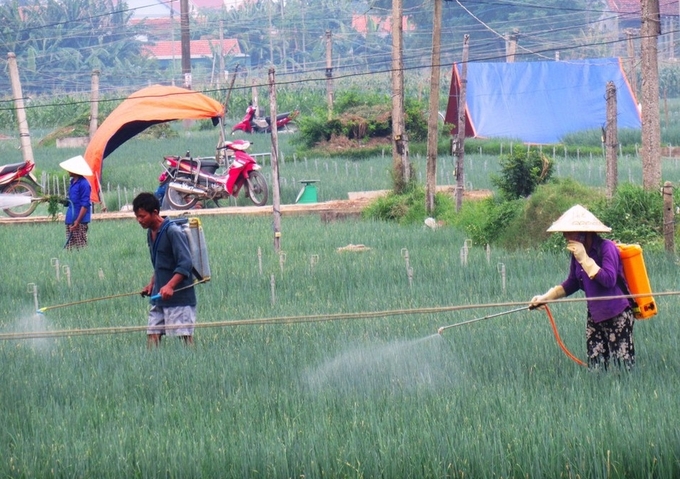
Farmers in the coastal area of Quynh Luu (Nghe An) district spray pesticides to prevent pests and diseases in vegetables. Picture: Xuan Hoang.
Monday: Pesticide use is widespread and difficult to control. When a crop is damaged by a particular pest, many farmers actually have to go to the market to ask about medicines they can use.
Mr. Nguyen Van At, a farmer in Vinh Thanh Township, Yen Thanh District (Nghe An), told us: Agricultural production is now mainly focused on each individual’s family, on one’s own family. Whenever a plant is infected with a pest, they go to kiosks or the market and ask for medicines to be sprayed. Drug sellers only need to sell drugs to get money, but after bringing them back, the spray is effective or not, regardless of the consequences, the consequences are “money loss, disability”, and also cause environmental pollution, affecting the health care system .
Tuesday: Pesticides are subject to conditional trade. However, the current management of this item is still unclear. Although the responsibilities are clearly defined, the control is not continuous, especially at district, city, city, district and community level.
According to the Nghe An Plantation and Crop Protection Subdepartment, there are currently 637 companies trading in pesticides in the province, not to mention the seasonal pesticide trade households. Failure to manage, audit and control current pesticides also contributes to the risk of widespread pesticide use and indiscriminate dumping of pesticide waste in fields.
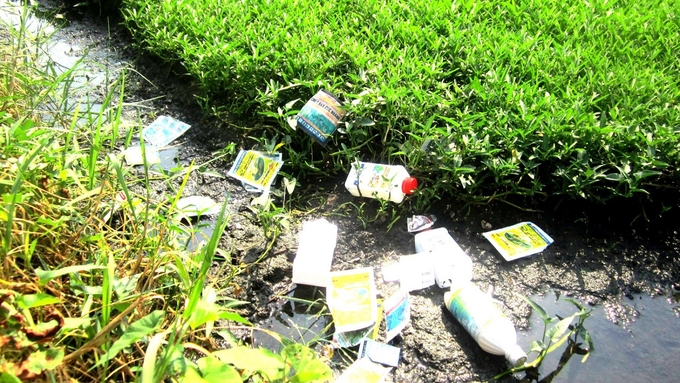
Disposal of pesticide packaging is still common in Nghe An.
Wednesday: It’s not really good to inform people and give them guidance 2 Things you need to know and do are:
It is important to know what pests and diseases the plant suffers from. If not, contact your local technical staff or county, city, or township agricultural service center to learn the most effective way to prevent.
The medicine must be used according to the instructions of the technical staff. When the medicines have been used up, all packaging, bottles, etc. must be collected and placed in the pesticide waste storage tank according to regulations. If there is no storage tank for pesticide waste, it must be collected for incineration or burial according to crop protection industry regulations.
Propaganda and guidance for every people on the above two things to know and do is very important, so that every people can be educated with awareness and responsibility for the use of pesticides and the collection of medical waste. BVTV. If that doesn’t work, there’s no point in building lots of pesticide waste storage tanks in the field.
Thursday: The number of storage tanks for pesticide waste is too small. Mr. Nguyen Van Duong, vice chairman of the Yen Thanh District People’s Committee, said that the entire district has 44,000 ha of agricultural land, including 13,200 ha of land for dual-crop rice production (spring and summer-autumn). According to an inter-ministerial circular between the Ministry of Agriculture and Rural Development and the Ministry of Natural Resources and Environment, the district’s rice-growing areas need 4,400 pesticide waste collection tanks. But now, with state support and its own funds, the district has built 2,275 tanks, covering 50% of the need.
In Do Luong district, Mr. Nguyen Kim Ngoc, director of the district’s agricultural service center, said the entire district currently has only 3,864 tanks for pesticide waste, compared with a need of more than 2,000 tanks.
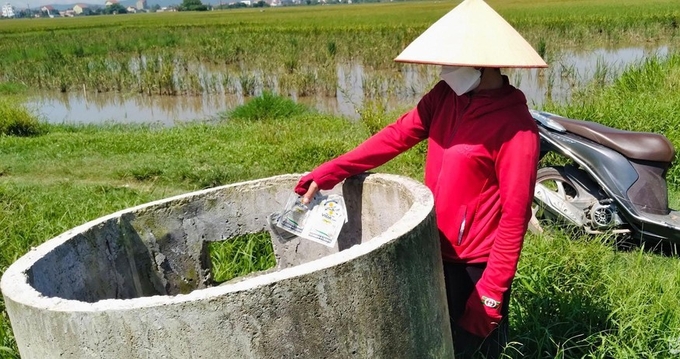
Pesticide waste storage tank in Vien Thanh Township, Yen Thanh District (Nghe An).
According to Mr. Nguyen Tien Duc – Director of the Cultivation and Plant Protection Subdivision of Nghe An Province – Nghe An annually grows nearly 154,000 hectares of rice, vegetables and short-term crops of all kinds, which must be grown in a pesticide waste collection tank with the amount required by the regulations 51,330 tanks. However, at the end of 2022, there are only 17,203 tanks left in the province, the number of missing tanks is 34,127 tanks, which is 66.48% of the need.
Some solutions and limitations
Through observation, summary and opinions of many experts in the agricultural industry, I see the need to implement the following solutions to better manage pesticide waste.
One: Strengthen communication and training to educate all people about the serious harms of widespread use of pesticides and indiscriminate dumping of pesticide waste in the fields.
At the same time, farmers are trained and guided in recognizing a number of common pests and diseases in the field, as well as using pesticides according to the “4 right” method (right drug, right concentration of pesticide, the right dose and the right spraying technique).
After using all pesticides, all packaging, bottles, etc. must be collected and placed in the pesticide waste tank. If there is no pesticide waste storage tank, collect them and store them in a designated place of the hamlet, township, hamlet or village to burn or bury according to the guidelines of crop protection industry and environmental resources.
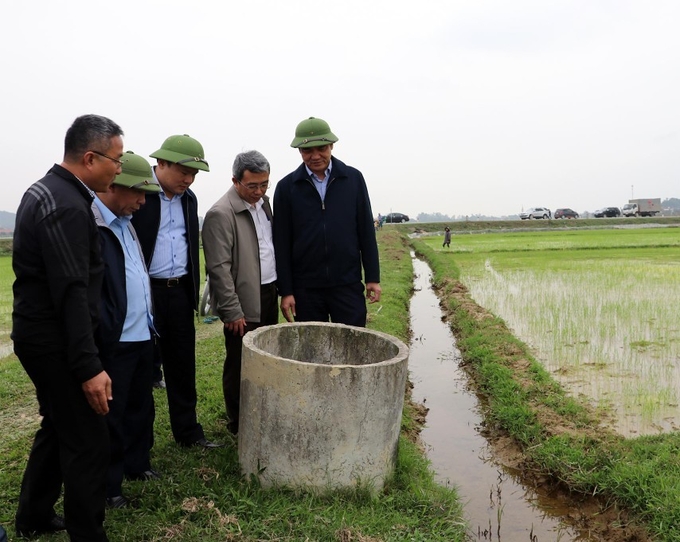
Nghe An province still lacks more than half of pesticide waste storage tanks compared to needs.
Two: Strengthen management, inspection and control of pesticide trade throughout the province. The responsibility for organizing inspection teams to inspect and control pesticide trade is not only the responsibility of the agricultural sector in the province, but also the responsibility of many sectors (agriculture, police, industry and commerce, taxation, environmental resources, etc.). ) Schools…) and municipalities, in particular to prevent the sale of pesticides without a trade license, without proof of training, etc.
Father: The central government and local level spend a reasonable amount of money every year to support agricultural production companies to set up many pesticide waste storage tanks according to the inter-ministerial regulations between the Ministry of Agriculture and Rural Development and the Ministry of Natural Resources. – MT decided on May 16, 2016 to quickly shut down the system of pesticide waste collection tanks in townships.
Four: Building some models to apply scientific and technical advances to intensive production with fewer pests and less use of pesticides, such as production processes according to IPM, ICM, SRI laws and honey cultivation. Thrift combined with organic farming. Building a model for the effective collection and treatment of pesticide waste. Since then he has been organizing conferences, seminars, study trips and reproducing the model.
A proper reward and punishment mechanism is needed to encourage collectives and individuals to do well the policy of waste collection and storage in storage tanks without causing pollution. Punishment comes in many forms from criticism, reprimand to fines so everyone needs to be aware and accountable for strictly following the policy as required. Communities can establish an internal agreement so that all members in the community are responsible for strict implementation.

